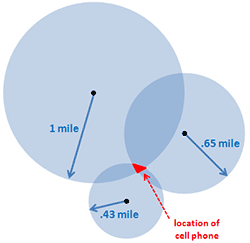EFF: access to the coordinates of cell phones without a warrant violates the Constitution
 As you know, law enforcement agencies in different countries have constant access to the switches of mobile operators. They can track in which cell any phone is registered, determining its coordinates with an accuracy of several tens of meters. The police and special services are constantly taking advantage of the opportunities: such surveillance takes place not only in Russia, but also in the USA.
As you know, law enforcement agencies in different countries have constant access to the switches of mobile operators. They can track in which cell any phone is registered, determining its coordinates with an accuracy of several tens of meters. The police and special services are constantly taking advantage of the opportunities: such surveillance takes place not only in Russia, but also in the USA. However, lawyers of the Electronic Frontier Foundation (EFF) believe that tracking phones is illegal, namely, violates the Constitution. On Friday, the EFF jointly with the American Civil Liberties Union (ACLU) filed an applicationto the Court of Appeals for the US Seventh Circuit in Chicago, where they expressed their position. Information about the coordinates of a mobile phone at a known time and date creates an exhaustive picture of human movements. “Since we always carry telephones with us, this data may only disclose personal information, for example, about a visit to a doctor, a political rally or meeting with a friend.
Citizens have the right to expect that such information remains confidential and inaccessible to police officers until they receive a court order.
EFF filed its application as part of the US v. Patrick. There, a Wisconsin resident was found guilty of arms possession. Through a mobile operator, the police tracked his movements in real time to the car. There, the police found a weapon at his feet - and made an arrest. EFF and ACLU lawyers explain to the court that tracking mobile phone coordinates in real time violates the Fourth Amendment to the US Constitution, which prohibits unreasonable searches and detention.
“This is the first time that a federal appeals court with jurisdiction over Illinois, Wisconsin, and Indiana will consider whether citizens can count on the privacy of real-time mobile phone coordinates,” said Jennifer Jennifer, Senior EFF Attorney Lynch). - This case is being considered at a time when everyone is gradually recognizing the private nature of such information. Legislative acts of the three states, which are part of the seventh district, all prohibit real-time surveillance without a warrant. California and at least eight more states also require warrants for real-time surveillance. ”
But at the federal level, conflicting laws apply. In 2014, the Atlanta County Court of Appeals ruledthat citizens cannot have the expectation of confidentiality with respect to historical logs from cell towers, so the police do not need a warrant. At the same time, the Fourth Circuit Court of Appeals in Richmond (Virginia) in 2015 took the opposite decision .
The US Supreme Court also acknowledged that information about a person’s movements and his mobile phone can give out a lot of confidential information - in fact, it reflects his whole life. Therefore, a search of a mobile phone during an arrest, as well as tracking a vehicle via GPS, now require a search warrant.
“The Seventh Circuit Court of Appeal must follow the direction given by the Supreme Court and recognize that the police must not be given free access to the records that our every step gives. Law enforcement agencies must obtain a warrant before accessing a large amount of private information obtained from records with mobile phone coordinates, ”said Adam Schwartz, EFF senior lawyer.
